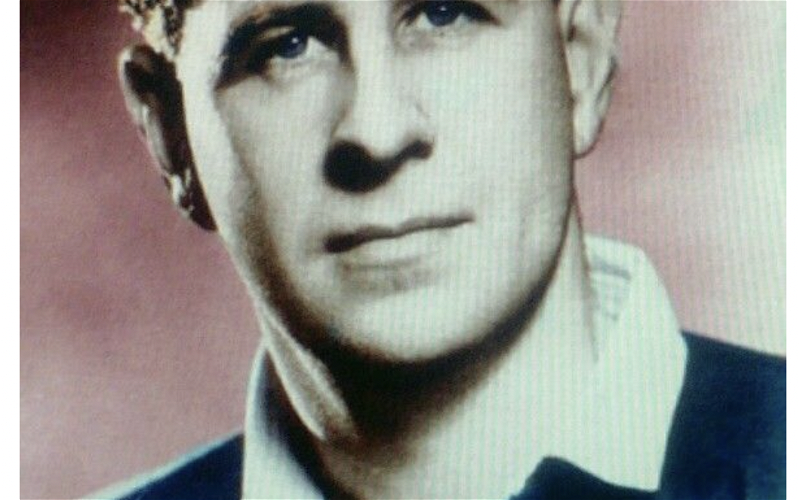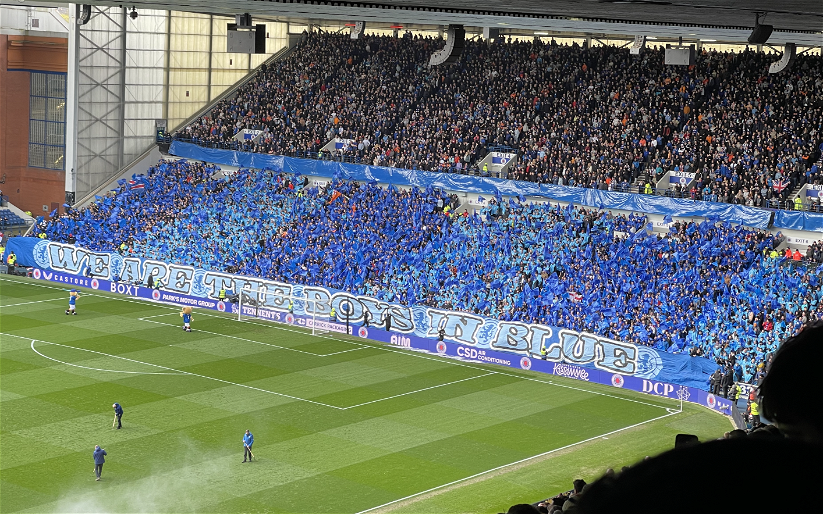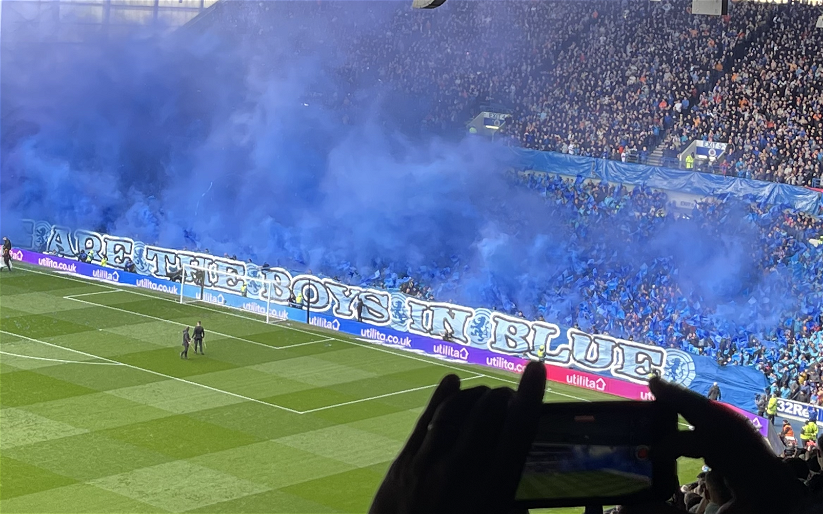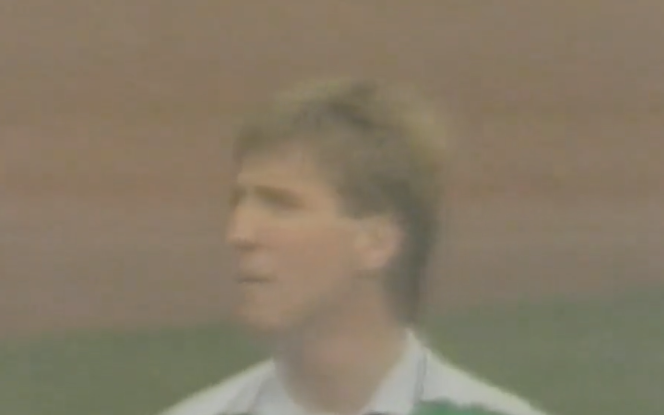By David Herd.
HOW CAN YOU BUY A LEGEND LIKE THIS?
WILLIE WADDELL, DIED OCTOBER 14TH 1992.
There were many worthy candidates in the Greatest Ever Ranger poll carried out in 1999 which was won by the great John Greig. Given some of the giants who wore the blue jersey in the 127 years prior to the vote, it was always an impossible question to definitively answer. Greig was a colossus, and few would want to argue too strongly about it. But my old dad didn’t vote for him, he voted for another truly legendary figure from the club’s glorious past. He voted for a man who passed away 30 years ago today, on October 14th 1992. He voted for Willie Waddell.
Waddell’s contribution to the club during my lifetime was all off the pitch, and to most fans still alive he is thought of in this way. But he was a very special player, one whose whole career was in the blue of Rangers. He joined Bill Struth’s Rangers as a 15-year-old and made his debut in the reserves on the right wing against Partick Thistle at Firhill before his 16th birthday. His first team debut wasn’t all that long later, when on August 29th 1938 the 17-year-old Waddell lined up in a glamour friendly against Arsenal at Ibrox and scored the only goal of the match. For the next 16 years, he was the undisputed first-choice right winger for the club.
His statistics as a player make impressive reading, although incredibly they should be even better. Waddell started in 558 competitive matches for Rangers, his final appearance being in a defeat at Pittodrie in April 1955 at the age of 34. He scored 143 goals, a strike ratio of a goal every 4 games from the right wing in a career spanning 17 seasons. Amongst those goals was a famous last-day solo goal at Palmerston that won the league title in 1953, a 75th minute wonder goal that snatched the title from the great Hibs team of the time. He also scored some memorable goals in Old Firm wins, including a winner in front of the second-biggest Ibrox attendance of 105,000 in a League Cup showdown in October 1948, the winner in the 1951 New Year game, and a double in the record-breaking 8-1 win over them in 1943.
Waddell won 10 league titles as a Rangers player, 6 of them during the “unofficial” war years. His medal haul in the major domestic cup competitions was nowhere near what it could have been, he missed several winning finals due to injury. He did win the Scottish Cup twice in 1949 and 1953, missing both the 1948 and 1950 victories. And he also had to sit out both of the League Cup wins in the post-war years in 1947 and 1949, the first of these due to an injury sustained in the semi-final win over Hibs. Waddell had scored that day as Rangers defeated the “Famous Five” from Leith 3-1 in front of 125,000 people.
As a right winger, Waddell had everything. He had pace, he had great skill, he had an eye for goal, and he had the ability to deliver accurate and telling crosses. His telepathic partnership with centre forward Willie Thornton was the winning difference in countless matches in the 1940s and early 1950s, centre forward Thornton’s magnificent ability in the air perfectly complimented by a winger who knew just how to find him. A large number of Thornton’s 248 Rangers goals were created by the genius of Waddell.
And such ability meant Waddell would be a Scotland regular as well. He won 18 official caps, plus 8 more during WW2, a highlight being a famous 3-1 win at Wembley in 1949, Waddell ending Derby County full-back John Howe’s international career as he terrorised the hapless defender. This was the first England defeat in the Home Internationals since wartime football had ended and official competition had restarted. His brilliance made him the “pin-up” player of that Rangers team, and his priceless worth to the team was summed up in the great old Rangers song of the time “How Can You Buy Willie Waddell”.
Such a stellar playing career would earn Willie Waddell a place in Ibrox immortality without the achievements that would follow. But he would make his mark in many other ways too. He became Kilmarnock manager in 1957, and in 8 years in charge at Rugby Park he guided the team to a Scottish Cup final and 2 League Cup finals, all of them lost. But in 1965, he gained immortality at a second club when his Killie side won 2-0 at Tynecastle on the final day of the season to overtake league leaders Hearts and win the championship on goal average. This was the first and only time Kilmarnock were league champions. That same season he gave a glimpse of things to come in continental competition, when his Kilmarnock team amazingly fought back from a 3-0 away defeat to Eintracht Frankfurt in the Fair-Cities Cup to win the home leg 5-1 after conceding in the opening minutes to go 4 goals behind in the tie. This was a match also famous for the performance of 17-year-old winger Tommy McLean, a man who would enjoy greater future success under Waddell’s management.
Waddell left Kilmarnock later that year, his 55% win ratio in 389 competitive games remains the club’s best managerial record. He left football to write about it, working for both the Evening Citizen and The Daily Express. In the late 1960s, his criticisms of Rangers and manager Davie White left a sour taste in the mouths of many Rangers fans, although Waddell would always maintain it had been done out of his desire to see his club back at the top.
He returned to football in 1969 after White’s sacking, becoming just the 5th manager in Ibrox history, and taking on the job many thought he was always destined to fill. Assisted by his old teammate Thornton, he was single-minded and ruthless, discarding Jim Baxter not long after taking over. He would also later treat Willie Henderson in a similar way, just prior to the 1972 final in Barcelona, an act seen as unnecessarily brutal after so many years of great service by another wonderful right winger.
His first great triumph as Rangers manager arrived in October 1970, an iconic League Cup final win over the dominant Celtic of the time. 106,000 watched on as the underdogs from Ibrox, without injured captain John Greig and with untested 16-year-old Derek Johnstone sensationally selected up front, won 1-0 with the fairytale completed by Johnstone scoring the only goal. Waddell remained manager until the summer of 1972, and only won 1 other trophy, but what a trophy it was. He guided the team past genuinely top-class opposition to reach the final of European Cup-Winners’ Cup, the semi-final defeat of Bayern Munich being arguably the greatest result ever achieved by a Scottish club in Europe. Colin Stein scored one, and Willie Johnston two. It remains, sadly, the one and only European trophy lifted by a Rangers captain, captain John Greig and manager Willie Waddell ensuring their names sit at the top of the list of Ibrox achievements.
In between these 2 glorious successes, Waddell’s time as manager was filled with disappointment on the pitch, and overshadowed by tragedy off of it. In his tenure, his overall record in matches against Celtic was awful, that League Cup final win being the only time he got the better of Jock Stein. League finishes in his only 2 full seasons were 4th and 3rd, with Celtic finishing 15 then 16 points ahead at a time when it was 2pts for a win. But on January 2nd 1971, the tragic deaths of 66 fans after the Old Firm league game at Ibrox on Stairway 13 made league placings irrelevant.
Waddell led the club through this darkest of times. He ensured every hospital caring for the injured had visits from his players. He personally attended as many of the funerals as he could, and made sure the playing staff were represented at them all. His great dignity and caring shone through the darkness, and he vowed no such horror would ever happen at the home of his club ever again.
He left the manager’s job after the 1972 victory, taking on the role of General Manager. He defended the club while hooliganism blighted several games Rangers took part in, while delivering harsh words to the fans on what could happen if such behaviour persisted. In 1978, he demonstrated how he reacted when he felt the club had been wronged, an SFA committee deciding that a 5-3 win over Motherwell at Fir Park be scrapped and the game replayed due to a pitch invasion by the away support when Motherwell had scored to go 2-0 in front. His was not the way of a dignified silence or a press release. He called a press conference, and angrily told reporters “There have been many pitch invasions in Scottish football in recent times and little has been said about them. Why should we be sitting ducks? It is little short of victimisation. I declare on behalf of the players, the management, and the vast majority of decent Rangers supporters that under no circumstances will we back down on this issue”. He won, the initial decision to replay the match was reversed and a fine imposed on the club instead.
By now, Waddell was Managing Director and Vice-Chairman, and his greatest off-field legacy was on the verge of reality. The vast sums generated by Rangers Pools was to be put to use, Ibrox stadium started its transformation that summer from the iconic old terracings into the modern all-seated stadium that we know today. Waddell had been the main driving force behind this massive undertaking, and he had visited many of the biggest and best arenas in European football of the time to gain insight on what could be done and what the final design would be. His promise to the victims and families of 1971 would be kept. In 1981, just as the new stadium was nearing completion, Rangers announced that Waddell was stepping down from his executive role and would remain a director. He stayed on the board of the club up until his death in 1992 at the age of 71.
As a Ranger, there is no doubt Willie Waddell sits at the very top table of legendary figures. His love of the club, and his ruthless determination to see the club’s name always protected made him something of a dictator to many. His relationship with another great Ranger, Jock Wallace, was subject to much speculation, especially after Wallace sensationally decided to leave the club just after winning his second treble. His treatment of some good men and some great players was questionable, at best.
But to many others, he was the man who shaped their career. Alex MacDonald, for example, tells how Waddell’s advice transformed him as a player, and how his change from playmaker to box-to-box midfielder transformed his Ibrox role and made him the player he was. John Greig would describe him as “like a second father”.
It is now 30 years since the death of Willie Waddell. Very few fans are still around who saw him play. It’s over 50 years since he left the manager’s chair. And it’s over 40 years since he was the absolute power at Ibrox. His story, and his legacy, needs to be told so that those too young to remember him will know what a massive figure he was in our wonderful club’s history.




